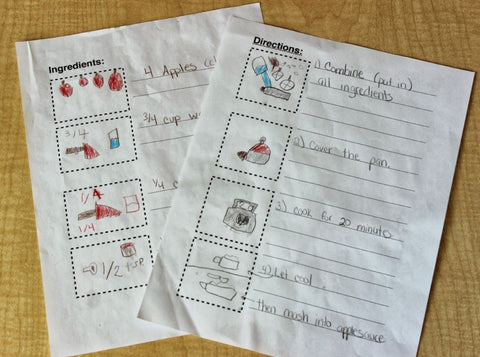
Ready, Set, Baaaaaaake!
Children learn best when they do not realise they are learning. It has been argued that "real" learning does not take place in an artificial classroom environment, but through engagement and interaction with everyday tasks. As many of you know, Bigjigs HQ is often awash with tonnes of cakes and baked goods (mostly created by Sharon!); whilst many of us try and resist these little fancies, the majority fail and end up sticking about 7 cupcakes in their gobs!
Great British Bake Off
As it was the Great British Bake Off final this week, we thought about how youngsters can develop their skills and learning through baking. We think the key to baking is to be completely open and to follow a natural flow of learning as it happens, without being solely focussed on one subject area, as there is a lot to talk about with baking whether that be counting, reading or even understanding where our ingredients come from. Children will be more receptive to knowledge if they are taught through practical application.

Here are some things that baking can teach...
Numeracy
Maths is the first subject that comes to mind when baking. Youngsters can learn all sorts from weighing flour to measuring cake tins to understanding mass and volume. Children can also learn about metrics i.e. how many grams there are in a kilogram, how many eggs have been used, how many times they have licked the spoon...! Children often see numeracy as boring... but if used in a fun context, then youngsters will not even notice they are learning. You can also use fractions when it comes to cutting up your cakes or pies... just means you have to cook more of them!

Reading and Writing
Unless you are Mary Berry or Paul Hollywood, the majority of us have to follow an ingredients list and a recipe. What does this require? Reading and writing. Children can practise their writing skills whilst learning new words and spellings by writing out the list of ingredients and the recipe, you could even get them to design fun menu's or posters to showcase what they have baked! Whilst reading and writing are not the first thing that come to mind when you are trying to bake a Key Lime Pie, it is an essential part of the preparation process!

Art and Design
Which little ones do not love getting messy!? Baking is the perfect opportunity for children to get messy without getting told off for doing so...unless they tip the entire meringue mix on their head, we cannot condone that one! From designing a cake to decorating it to putting it on a menu, the opportunities for children to flourish creatively are endless. Children should be given full reign to create the bakes they want to whether that involves food colouring to create colourful masterpieces or cutters to create bespoke cookies. The more freedom a child is given at the creative stage, the more they will push the boundaries and create unique pieces, of which they will become proud of...even if it does look like this cake FAIL.

Science
Baking is a kind of experiment, with some outcomes ending up completely disastrous (usually mine!) Let children experiment with different ways of doing things, coming up against challenges and encouraging them to overcome them. One of the best things about baking is experimenting! Allow youngsters to use different methods and processes to develop their learning. Children are naturally inquisitive and will ask questions throughout the baking process such as... why does the mixture change when you add an egg? Why does baking powder make it rise? Why do we need to line the tin? And why does it have a soggy bottom? ... Even if you do not know these questions, it is good to go on a learning adventure together!

Ecology
Baking is a great way of talking about the ingredients you are using, all of which have a story about where and how they have gotten on your kitchen worktop: where do eggs come from? how is flour made? why do bananas grow on trees? Talking about the ingredients and the processes they go through to reach our tables will teach children about the importance of foods, plants and animals. You could even take a trip down to your local farm to show you youngsters the ecology of foods.

Geography, History and Religion
The UK is a highly multicultural society which has benefited greatly from incoming traditions and recipes. Children can learn about the different origins of particular cakes or foods, or the learning different words from other countries (usually French when it comes to baking, patisseries, chef, choux, ca va? etc). Children will be fascinated to know that baking is not just a UK-centric pastime, but a global one! This can also lead on to the subject of religion explaining the link between baking and religious festivals such as hot cross buns or Chinese New Year cake etc. The list is endless.

Whilst the majority of us think of baking as delicious cakes, struddles and such like delights; there is so much more to it! Not only is it good for allowing children to experiment and develop different skills and knowledge, it encourages them to go through process to reach an end goal! This sense of achievement for reaching that goal (even if they used salt instead of sugar) is vital in boosting confidence and self-esteem... plus you get to eat cake at the end of it - win win! If you are looking for children's baking equipment then look no further than the Bigjigs Young Chef's Baking Set
